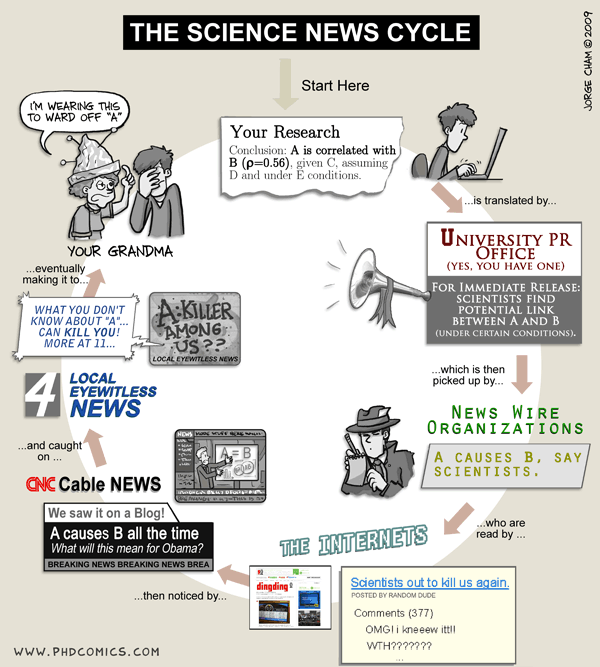Biological literacy: execute cannot be pardoned
 To be considered literate in the broad sense of the word, a person must not only write without mistakes and be able to count, but also understand history, politics, be well-read and so on. Now computer literacy has become firmly established in this list - it would be very strange not to meet it there, given that we have been dealing with computers at every step for several decades.
To be considered literate in the broad sense of the word, a person must not only write without mistakes and be able to count, but also understand history, politics, be well-read and so on. Now computer literacy has become firmly established in this list - it would be very strange not to meet it there, given that we have been dealing with computers at every step for several decades.But computer technologies are not the only ones that have received such rapid development in recent times. For example, space ships plow the expanses of the universe ... the truth is the life of an arbitrarily taken person is far from space exploration. Yes, and the Hadron Collider does not interfere in the existence of most people (launched, the end of the world did not come, that's all).
It is quite another thing - biotechnology , and in general the whole field of knowledge, from which their legs grow (biology and genetics in particular). Biology has already firmly taken place in everyday life, but, unfortunately, understanding it is not yet considered necessary.
')
Therefore, we have created a Russian-language open online course " Molecular Biology and Genetics ", which can still be joined until November 24, 2014, or later be held in free mode. Below is a little about him.
Examples of delusions
It is a little insulting to give such a hackneyed example, but there is no place to go from it: GMO (genetically modified organisms). A very popular topic of discussion is what it is, how harmful it is, unnatural or justified. And it is very correct that this topic is popular: it is worth discussing. But for this you need to understand it. Or vice versa - there are topics that are not being discussed, but should be. For example, enhanced self-medication with antibiotics of viral infections.
I am writing this text now, and in the next window Russian-language Wikipedia is open, in which it is written in black and white that antibiotics are commonly used in the fight against viruses. This is a failure. And if it is still possible to argue about the criteria of education, then how people do not treat each other, but maiming, it is just painful to watch.
The funny thing is that in order to avoid such annoying misconceptions, the most basic knowledge of biology is sufficient. It is not necessary to have a diploma of biological faculty; There is no need to even take long in-depth online courses like Eric Lender’s wonderful “ Introduction to Biology - The Secret of Life ” at EdX - just a simple introductory course is enough to refresh school knowledge and learn the basics of cell biology and genetics.
Course Format
 Molecular biology and genetics - a massive open online course (MOOC) on the Stepic platform, is a three week short lecture in Russian, interspersed with a variety of tests. As on most other MOOC platforms, videos are available at any time of the day or night, tests are checked by an automated system, and thousands of people pass the course at the same time.
Molecular biology and genetics - a massive open online course (MOOC) on the Stepic platform, is a three week short lecture in Russian, interspersed with a variety of tests. As on most other MOOC platforms, videos are available at any time of the day or night, tests are checked by an automated system, and thousands of people pass the course at the same time.The course content corresponds to the first month of the program, developed for students of the Institute of Bioinformatics programmers, so we will be especially happy to see people from the field of IT among the students. By the way, about this and two other courses on Python and Linux are also briefly on habr .
During the course, the listeners are told in an annoying manner how a living cell is organized and what processes occur in it, how viruses differ from cellular organisms, how a gene works, how genetic information is organized, and much more.
Of course, in three weeks it is impossible to consider all the applications of these topics in everyday life, so we focused on the theory. Our main goal is to give the participants a range of knowledge that will help them to answer their own questions. Join now!
Course program
- Cell Biology
- Biological taxonomy
- Membrane structure
- Prokaryotes: cell structure
- Prokaryotes: the organization of genetic material
- Eukaryotes: cell structure
- Eukaryotes: the organization of genetic material
- Nucleic acid structure
- Genetic code
- Squirrels
- Biological macromolecules
- Mitochondria and chloroplasts
- Viruses
- Molecular biology
- Central dogma of molecular biology
- Replication
- Transcription
- Splicing, alternative splicing
- Broadcast, ribosomes
- Protein folding
- Prions
- Genetics
- Inheritance, the role of DNA in heredity
- Recombination
- Hereditary diseases
- Vertical and horizontal gene transfer
- Mutations
- Natural selection
- Evolution: micro and macroevolution
Attention poll!
Source: https://habr.com/ru/post/362637/
All Articles